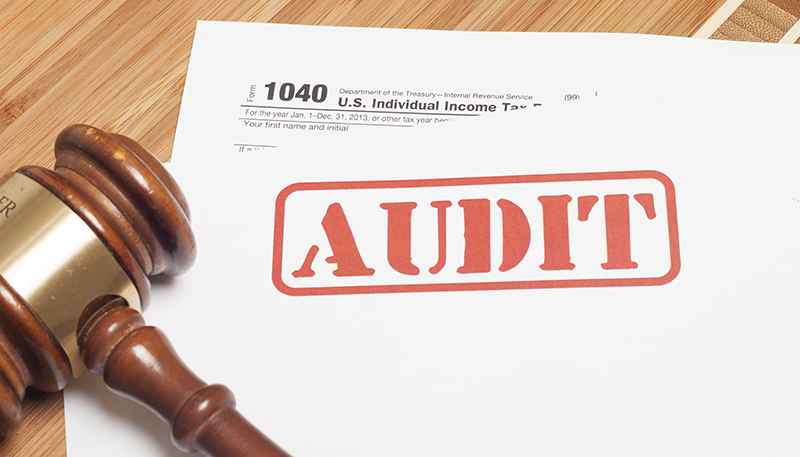Five tips on how to avoid an IRS tax audit
February, 20 2020 by Carolyn Richardson, EA, MBA
You’ve clicked “send” on your most recent tax return, and now the nail-biting starts. “Will the IRS accept the return? Did I do everything right? What if I get audited?”
While the odds of the IRS auditing your return are low, we know there are certainly “triggers” that increase your chances of being audited. For example, a large loss or unusual deduction may flag your return for a closer look. Omitting income, even by mistake, is another red flag that frequently results in at least a letter from the IRS, even if it’s not a full-blown examination. Whether it’s an audit or a notice, receiving a letter in the mail from the IRS is most taxpayers’ worst nightmare. So, what can you do that will lower your risk even further?
First, your best protection to prevent an audit is to file a complete and accurate return. Even if you think you don’t owe any taxes and had no payments to reclaim, if you had income you probably have to file. If you fail to file and were required to, you’ll likely hear from the IRS. The income limits for self-employed persons is particularly low, only $400 in net earnings. Verify that you have included any income reported to you from employers, clients, vendors, etc. Double-check that your claimed deductions are backed up by proof of the expense, such as receipts which show what was purchased and how it was paid for. A credit card statement is not enough to show that an expense is a legitimate deduction, so always keep the receipts. If there is nothing for the IRS to “find” during an inquiry, then it will go away quickly and quietly with no additional taxes due.
Second, if you know you had income from a source but don’t have a copy of the W-2, 1099, or other associated form, call the company that paid you and request a replacement. We frequently hear “I didn’t get the form” from clients who have received IRS matching notices, but not receiving the form is not an excuse for failing to report income you know you received. While you may not get dinged for missing $100 of interest, failing to report $10,000 or even $100,000 will certainly result in the IRS paying attention. And do you really want to explain to the IRS how you somehow “forgot” that $100,000 retirement distribution you received?
 Third, if you are operating your own small business, maintaining accurate books and records is a must. This is important not only in the event of an IRS audit, but also because most small businesses have other filing requirements to meet, such as for sales and use taxes, and those agencies conduct audits on a more frequent basis than the IRS typically does. If you don’t understand your accounting software, that can result in even bigger issues. Take a class at your local community college on your bookkeeping software, or find out if the vendor offers seminars, workshops, or one-on-one training for the product. If you’re completely hopeless at bookkeeping, hire a bookkeeper for a few hours a month. It will be money well spent. Not only will it help in an audit to have accurate books, but it may also alert you to the possibility of theft from your business, or out of control spending that you can curb. Additionally, it’s important to have good financial reports when trying to obtain lines of credit or loans for your business.
Third, if you are operating your own small business, maintaining accurate books and records is a must. This is important not only in the event of an IRS audit, but also because most small businesses have other filing requirements to meet, such as for sales and use taxes, and those agencies conduct audits on a more frequent basis than the IRS typically does. If you don’t understand your accounting software, that can result in even bigger issues. Take a class at your local community college on your bookkeeping software, or find out if the vendor offers seminars, workshops, or one-on-one training for the product. If you’re completely hopeless at bookkeeping, hire a bookkeeper for a few hours a month. It will be money well spent. Not only will it help in an audit to have accurate books, but it may also alert you to the possibility of theft from your business, or out of control spending that you can curb. Additionally, it’s important to have good financial reports when trying to obtain lines of credit or loans for your business.
Fourth, if you are using bookkeeping software, use that to prepare your return. This is true even if you are only using personal finance software to track your personal expenses. Use the actual numbers from the software, and do not use estimates of what you spent. Round numbers on a return may occur naturally, but they do not occur for every expense and using them throughout your return may raise flags. Another advantage to using the numbers from your software is if you are questioned, you will know exactly how you reached the number on the return and can provide a quick answer to the IRS or to your representative. This can shorten the amount of time any examination takes considerably, as it will eliminate the need to hunt around for receipts that then need to be added back together to see if they match the figure on the return.
Fifth, review your return with a careful eye to make sure that you entered everything correctly. While most taxpayers file electronically now, computer generated returns are only as good as the entries that go into them, or as they say, “garbage in, garbage out.” Shifting the decimal place or transposing a number on an entry may result in a larger refund, but it also almost always results in an IRS notice. If you use a tax preparer, you should still carefully review your return. Even the best preparers can make mistakes but reviewing your return will also alert you if your tax preparer is shady. It’s not uncommon for the questionable tax preparer to utilize fake business or dependents to increase your refund, and those would be obvious once you look beyond the bottom line.
If you’re still worried about being audited, it may be best to look for audit protection. TurboTax users can sign up for prepaid audit defense when they prepare their return, and prepaid audit defense is also available by visiting our webpage.
While preventing an audit may seem like a lot of work, peace of mind and restful nights are worth the effort.





